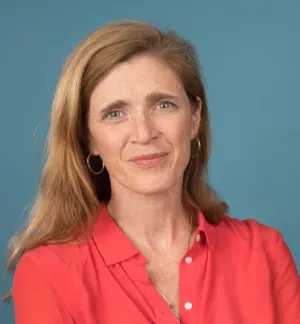
Thanks to all the colleagues who have come out for this very important event. It has been more than two years since Russia held its sham referendum in Crimea in an attempt to legitimize its occupation of a part of sovereign Ukraine – a sovereign UN Member State. It has been nearly two years since 100 Member States of the United Nations General Assembly, including the United States, adopted a resolution affirming our shared commitment to “the sovereignty, political independence, unity, and territorial integrity of Ukraine within its internationally recognized borders,” and underscoring that the referendum, “having no validity,” should not be recognized.
It can be easy to forget – as more times passes, and far removed as many of us are from what is happening in your country and to your people – that Russia’s attempted annexation of Crimea is not a one-time violation of Ukraine’s sovereignty, but rather represents an ongoing, continuous violation, one that persists for every day that Russia continues to occupy the peninsula. The passage of time does not change the facts; Crimea was, is, and must and will remain part of sovereign Ukraine – and we refuse to accept Russia’s attempt to use force and to use propaganda to alter that fact. That means we cannot allow ourselves to get used to a new normal, a world in which one of five permanent members of the Security Council – a body whose primary responsibility is maintaining international peace and security – where one of the permanent members itself becomes the source of threats to the sovereignty and territorial integrity of another UN Member State. Failing to hold Russia accountable for these actions sends a dangerous message to governments around the world with similar ambitions.
If that is not reason enough for us to insist that Russia end its occupation and return control of Crimea to Ukraine, the abysmal human rights situation in Crimea should be. As the UN Human Rights Monitoring Mission in Ukraine, special rapporteurs, and independent human rights groups – all of whom have been forced to carry out their work with little or no access to Crimea – have documented, the occupation authorities have committed serious and widespread abuses targeting members of ethnic and religious minorities, as well as anyone who dares to criticize the occupiers’ actions or question their legitimacy.
Let me just give a few recent examples.
On February 15th, the so-called prosecutor general of Crimea filed a request with Crimea’s Supreme Court to have the Mejlis – the self-governing body of the Crimean Tatars – to be declared an extremist organization. Just like that. Both Crimea’s prosecutor general and the justices of its Supreme Court have been installed by another country – by Russia – since the occupation began. If the prosecutor’s request is granted, virtually all Tatar political expression and organization would effectively be criminalized.
Mustafa Dzhemilev is here, of course, with us today – the former head of the Mejlis and current member of Ukraine’s Rada. In April 2014, Mr. Dzhemilev was banned by occupation authorities from entering Russian territory for five years, including – by their perverse definition – Crimea. Then, on January 21st of this year, occupation authorities in Crimea issued a warrant for Mr. Dzhemilev’s arrest. So let’s get this straight, it seems Mr. Dzhemilev is now allowed to go back to his native land, so that he can be arrested. Refat Chubarov, the current leader of the Mejlis, who is here today as well, was also banned from entry into Crimea for five years in July of 2014.
Ever since the little green men first began to pop up in Crimea, human rights monitors have documented abductions of Tatars and pro-Ukrainian activists, in which evidence points to the participation of occupation authorities and their security forces, suggesting these are cases of what we call enforced disappearances. According to the UN Monitoring Mission, Crimean Tatars Islyam Dzhepparov, who was 18, and his cousin, Dzhevdet Islyamov, 23, were reportedly abducted by men in black uniforms and thrown into a minivan on September 27th, 2014. Similarly, nearly a year later on August 27th, 2015, according to the UN Monitoring Mission, Crimean Tatar Muhtar Arislanov was abducted by two men in uniform and thrown into a minivan. None of these victims, or others whose abductions in Crimea have been documented by the UN Monitoring Mission – along with evidence of the involvement of occupation authorities – has been found, nor has anyone been prosecuted for their disappearances.
It is not only Tatars who are being targeted in Crimea – this is important to note – it is a wide range of critics of Russia’s actions. Consider the prosecution of esteemed Ukrainian filmmaker Oleg Sentsov. Sentsov was arrested in his home in Crimea in May 2014. He was sent against his will to Russia – to the town of Rostov – for trial by a military court, where he was charged with setting up a terrorist group and with two attempted arson attacks. Although, as the UN Monitoring Mission has noticed, “the main prosecution witness recanted in the courtroom, stating his testimony had been extorted under torture;” and despite the fact, as the mission noted, that “the process was marred by violations of fair trial standards and of the presumption of innocence,” which, “should have led to the release of the accused,” Sentsov was found guilty and sentenced to 20 years in a high security penal colony. Ukrainian activist Aleksander Kolchenko, who was accused of conspiring with Sentsov, was given a ten-year sentence.
Now just think about that for a moment: two Ukrainian citizens are detained on Ukrainian territory. They are transferred to Russia, and prosecuted in Russian courts, under Russian laws, for crimes they did not commit. And they are tried – and this is one of the most mind-boggling parts – as Russian citizens, having had Russian citizenship imposed upon them, against their will, after they were detained. It is a sequence of events so absurd that it feels like something out of a Bulghakov novel. Any yet all of it is horrifyingly real. As a result, right now – as we sit here – Sentsov and Kolchenko are imprisoned in a Russian penal colony, Kolchenko reportedly in solitary confinement.
Nor is this pattern of abuse limited to Crimea. Also at this moment, Ukrainian pilot and member of parliament Nadia Savchenko – who was also detained in Ukraine and sent to the remote town of Donetsk, Russia to be tried under Russian laws for similarly preposterous charges – is awaiting her verdict. The prosecutor in her case is seeking a 23-year sentence.
Imagine for just one moment if Oleg Sentsov or Nadia Savchenko were a citizen of any of our nations. How would we react? How would we expect our fellow UN Member States to react? We have to put ourselves in the shoes of Ukrainians more often – in the shoes of the Tatars, in the shoes of the people who live in Crimea without basic freedoms. I assure you that, if we do, we will start making a lot more noise about egregious actions like this.
Russia would have us live in upside-down land, where up is down and down is up. We can’t accept that. We have to live in right-side up land, and we have to define and remind people about the norms that undergird the international system, on which all of our peace and security and human rights depend.
As we all know, so many of the patterns that we saw when Russia first invaded Crimea – and that we continue to see to this day – have also characterized Russia’s actions in eastern Ukraine. The steps Russia must take are straightforward: Russia must respect Ukraine’s sovereignty. Russia must stop arming, training, and fighting along separatists, and Russia must fulfill its Minsk commitments, including releasing unlawfully detained persons such as Nadia Savchenko. Of course Ukraine has responsibilities too, and we will keep working with the Ukrainian government so that it does its part to implement Minsk in full.
Until Russia begins taking these steps, let us not forget the responsibilities that we have – and by “we,” I’m referring both to our individual governments, and to the institutions we belong to. Just because Russia is trying to lop off parts of a neighboring country; just because Russia is committing serious human rights abuses with impunity against Ukrainians – and against its own people; just because Russia is consistently violating the core principles of the United Nations – does not mean we should resign ourselves to accepting Russia’s behavior, or even getting used to it. We too have a duty to ensure that our shared principles – which are indispensable to our shared security and our conception of what is right – that those principles are respected. We do not want to live a world in which this – what has happened to the people up on this dais – becomes the new normal. To preserve right-side up land, where black is black and white is white and up is up and down is down, we need to stand in solidarity on behalf of Ukraine’s territorial integrity, and on behalf of the human rights of its people – all of its people. I thank you.
###
Power, Samantha. “Remarks by Ambassador Samantha Power on “Crimea Was, Is, and Will Remain Part of Ukraine,” at an Event on the Second Anniversary of the Adoption of the UN General Assembly Resolution, “Territorial Integrity of Ukraine”.” March 17, 2016


